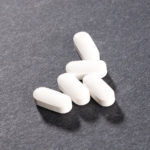By David Blyweiss, M.D., Advanced Natural Wellness
June 15, 2015
- Statin drugs target the wrong problem
- How this tangy fruit could save your heart
- Give LDL the boot and HDL a boost
If you’re considering taking a statin drug, or if you’re already taking one, I have important news to share with you today.
While it’s true that these drugs reduce low density lipoproteins – what you probably refer to as LDL cholesterol – they don’t do anything to safeguard your heart health.
The truth is statin drugs may actually increase your chances of developing heart problems in the future.
First off, these drugs contribute to coronary calcification. They promote the hardening of any plaque that has accumulated in your blood vessels.
MD Exposes the Hidden Danger to Your Eyes

When your eyesight starts to fail, it's a real problem. Suddenly you can't go to the grocery store... you can't get to the doctor if you have an emergency... you can't meet your friends for dinner…
Your "regular" doctor doesn't have time to keep up with the latest research. And the same goes for eye doctors. They go to school to learn how to fit you for glasses and contacts, but have no way of preventing the damage and loss of eyesight that threatens your freedom and independence.
Let me show you something that explains a LOT about how your eyes work.
In my FREE Special Report, I'll show you a HUGE, untapped resource for your eyes that safely and naturally restores clear, effortless eyesight.
Click here to get started...
This creates obstructions that reduce blood flow – and can ultimately deprive your heart of much needed blood and oxygen. And could, in turn, trigger a heart attack.
Secondly, statins can cause a deadly form of muscle damage called rhabdomyolysis. It’s a disease that causes severe muscle pain. And it can directly injure the muscular tissue in your heart! Strike two for statins.
Even more importantly, statins target the wrong problem altogether. (Strike three!)
You see, low density lipoproteins aren’t the bad guys you’ve been led to believe.
In fact, they have a very important job in your body. They patch up damage that occurs in the walls of your blood vessels and arteries. They help with the conversion of cholesterol into many of your hormones (through the steroidogenic pathway) and help transport cholesterol to astrocytes in your brain to help keep you thinking clearly. So yeah, they’re not really bad.
A much more critical aspect is the size of your LDL particles. If they’re small and dense, they tend to slip into the linings of your blood vessels. They become oxidized. Inflammation sets in. Plaque starts accumulating and blockages begin to develop.
That’s why I’m so excited about a sour and tangy fruit grown in the south of Italy.
The World's Quickest Solution for Ending Prostate and Urinary Misery
This has recently been revealed to be one of the only real breakthroughs in prostate health.
The seeds of a strange fruit (sometimes called "Chinese Apples") hold powerful phytonutrients that are a revolution in prostate health.
In fact, UCLA and Veterans Administration research have now proved this to be true.
Not only that, but it may be the worlds quickest solution for ending prostate misery.
Simply stated, these phytonutrients represent a huge step beyond beta sitosterol, saw palmetto, and other phytosterols alone.
Simply click HERE if you want to have fast prostate relief...restful, uninterrupted sleep...no more constant "urges to go"...enhanced virility...and optimal prostate support for life.
It’s something between an orange and lemon. But people don’t eat this fruit. It’s just too tart. (On the other hand, some people do drink the juice.)
This inedible fruit is called bergamot. And it’s loaded with flavonoids that can have a profound effect on your heart health. These flavonoids block the production of a key enzyme (HMG-CoA) in your body that influences the production of cholesterol.
And this is great news for you.
Extract from bergamot can…
- Help balance your LDL/HDL ratios. In just 30 days, it can boost your HDL by over 40%, while lowering your LDL by about 38%.
- Cut triglycerides by about a third.
- Significantly reduce the number of harmful small, dense LDL particles circulating through your bloodstream.
But the benefits don’t stop there.
Bergamot can also slash your risk of diabetes by lowering blood sugar. Since diabetes increases your risk of heart disease and stroke by two to four times, this can be a real life saver.
I recommend 500 mg. of bergamot daily in supplement form, or 100 ml. daily of the juice.
If you need a little additional heart support, here’s what I suggest:
Supplement with niacin: Niacin has long been known to protect your heart. Now we know that extended-release niacin has a specific effect on the smaller, more dangerous LDL particles. Plus it enhances the role of large HDL particles which also reduces cardio risk. Start off with 125 mg. and build up weekly until you reach 500mg.
Don’t forget to take your CoQ10! If you do decide to supplement with bergamot, or if you already take a statin drug, make sure to supplement with CoQ10. That’s because both suppress the enzyme HMG-CoA which isn’t only responsible for producing LDL cholesterol, but also has an influence on CoQ10 production.
However, I recommend CoQ10 to everyone because it provides the cellular energy your heart, muscles and other organs need to function properly. Look for the most bio-available form available. It’s called “ubiquinol.” Just 100 mg. a day can protect and preserve your heart health.
Sources:
Nakazato R, et al. Statins use and coronary artery plaque composition: results from the International Multicenter CONFIRM Registry. Atherosclerosis. 2012 Nov;225(1):148-53.
Mollace V, et al. Hypolipemic and hypoglycaemic activity of bergamot polyphenols: from animal models to human studies. Fitoterapia. 2011 Apr;82(3):309-16.
Gliozzi, M, et al. The Effect of Bergamot-Derived Polyphenolic Fraction on LDL Small Dense Particles and Non Alcoholic Fatty Liver Disease in Patients with Metabolic Syndrome. Advances in Biological Chemistry, 4, 129-137. 2014.
John M. Morgan, M.D. et al. Effects of extended-release niacin on lipoprotein subclass distribution. American Journal of Cardiology. June 2003; Volume 91, Issue 12 , Pages 1432-1436, 15






